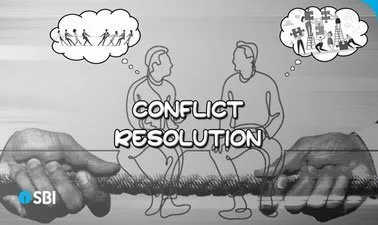
Conflict Resolution Skills 
This course teaches participants how to effectively resolve conflicts and create positive outcomes. It covers topics such as listening, verbal and non-verbal communication, and conflict management plans. Participants will gain the skills to develop and practice conflict resolution techniques. ▼
ADVERTISEMENT
Course Feature
![]() Cost:
Cost:
Free
![]() Provider:
Provider:
Coursera
![]() Certificate:
Certificate:
Paid Certification
![]() Language:
Language:
English
![]() Start Date:
Start Date:
10th Jul, 2023
Course Overview
❗The content presented here is sourced directly from Coursera platform. For comprehensive course details, including enrollment information, simply click on the 'Go to class' link on our website.
Updated in [March 06th, 2023]
Course Overview:
This course provides an overview of conflict resolution skills. It covers the basics of active listening, appropriate communication tactics, and how to create a conflict management plan. It also provides an understanding of how to use these skills to resolve conflicts in a positive manner.
Possible Development Directions:
This course provides the foundation for further development of conflict resolution skills. It can be used to develop a deeper understanding of how to use communication tactics to resolve conflicts. It can also be used to develop a better understanding of how to create a conflict management plan that is likely to yield positive resolutions.
Related Learning Suggestions:
This course can be used to supplement other courses related to communication and conflict resolution. It can also be used to develop a better understanding of how to use communication tactics to resolve conflicts. Additionally, it can be used to develop a better understanding of how to create a conflict management plan that is likely to yield positive resolutions.
[Applications]
Upon completing this course, participants can apply their newfound conflict resolution skills in a variety of settings. They can use active listening skills to better understand the other party's perspective, choose appropriate communication tactics to ensure their message is heard, and create a plan for managing conflict in a positive manner. Additionally, participants can use their skills to help others resolve conflicts in their own lives.
[Career Paths]
1. Mediator: Mediators are professionals who help parties in conflict reach a mutually beneficial agreement. They are trained to listen to both sides of a dispute and help them come to a resolution. This job requires excellent communication and problem-solving skills, as well as the ability to remain impartial and unbiased. The demand for mediators is growing as more organizations and businesses recognize the value of resolving conflicts quickly and efficiently.
2. Conflict Resolution Specialist: Conflict resolution specialists are professionals who help individuals and organizations resolve disputes. They use a variety of techniques, such as mediation, negotiation, and arbitration, to help parties reach a mutually beneficial agreement. This job requires excellent communication and problem-solving skills, as well as the ability to remain impartial and unbiased. The demand for conflict resolution specialists is growing as more organizations and businesses recognize the value of resolving conflicts quickly and efficiently.
3. Dispute Resolution Manager: Dispute resolution managers are professionals who help organizations and businesses resolve disputes. They use a variety of techniques, such as mediation, negotiation, and arbitration, to help parties reach a mutually beneficial agreement. This job requires excellent communication and problem-solving skills, as well as the ability to remain impartial and unbiased. The demand for dispute resolution managers is growing as more organizations and businesses recognize the value of resolving conflicts quickly and efficiently.
4. Negotiation Consultant: Negotiation consultants are professionals who help individuals and organizations negotiate agreements. They use a variety of techniques, such as mediation, negotiation, and arbitration, to help parties reach a mutually beneficial agreement. This job requires excellent communication and problem-solving skills, as well as the ability to remain impartial and unbiased. The demand for negotiation consultants is growing as more organizations and businesses recognize the value of resolving conflicts quickly and efficiently.
[Education Paths]
1. Bachelor of Arts in Conflict Resolution: This degree program focuses on the study of conflict resolution and its application in various contexts. It covers topics such as negotiation, mediation, and arbitration. Students learn how to identify and analyze conflicts, develop strategies for resolving them, and create plans for managing them. This degree is ideal for those interested in pursuing a career in conflict resolution, such as a mediator, negotiator, or arbitrator.
2. Master of Science in Conflict Resolution: This degree program builds on the knowledge and skills acquired in a Bachelor of Arts in Conflict Resolution. It focuses on the study of advanced conflict resolution techniques and strategies, as well as the application of these techniques in various contexts. Students learn how to identify and analyze conflicts, develop strategies for resolving them, and create plans for managing them. This degree is ideal for those interested in pursuing a career in conflict resolution, such as a mediator, negotiator, or arbitrator.
3. Doctor of Philosophy in Conflict Resolution: This degree program focuses on the study of advanced conflict resolution techniques and strategies, as well as the application of these techniques in various contexts. Students learn how to identify and analyze conflicts, develop strategies for resolving them, and create plans for managing them. This degree is ideal for those interested in pursuing a career in conflict resolution, such as a mediator, negotiator, or arbitrator.
4. Master of Arts in Conflict Resolution and Peace Studies: This degree program focuses on the study of conflict resolution and peace studies. It covers topics such as negotiation, mediation, and arbitration. Students learn how to identify and analyze conflicts, develop strategies for resolving them, and create plans for managing them. This degree is ideal for those interested in pursuing a career in conflict resolution, such as a mediator, negotiator, or arbitrator. It also provides a foundation for those interested in pursuing a career in peace studies, such as a peace researcher or peace educator.
The development of conflict resolution skills is becoming increasingly important in today's world. As the global population continues to grow, so does the potential for conflict. As such, there is a growing demand for professionals with the skills and knowledge to effectively manage and resolve conflicts. With the right degree, you can become a leader in the field of conflict resolution and help to create a more peaceful world.
Pros & Cons

Excellent background and strategies

Practical strategies

Active listening skills

Communication

Collaborative solution

Personal examples and interviews.

Not enough detail

Short course

Boring

Mostly theory.
Course Provider

Provider Coursera's Stats at AZClass
Discussion and Reviews
0.0 (Based on 0 reviews)
Explore Similar Online Courses

Getting Started with Elixir

Measurement Technique in Multiphase Flows

Python for Informatics: Exploring Information

Social Network Analysis

Introduction to Systematic Review and Meta-Analysis

The Analytics Edge

DCO042 - Python For Informatics

Causal Diagrams: Draw Your Assumptions Before Your Conclusions

Whole genome sequencing of bacterial genomes - tools and applications

Introduction to Conflict Management

Conflict Resolution

Mediation and Conflict Resolution
 Related Categories
Related Categories
 Popular Providers
Popular Providers
Quiz
 Submitted Sucessfully
Submitted Sucessfully
1. What is the main goal of someone engaged in conflict?
2. What is the first step in creating a conflict management plan?
3. What is the primary benefit of resolving conflict in a positive manner?
4. Which of the following is a skill that can be developed and practiced when resolving conflict?


Start your review of Conflict Resolution Skills